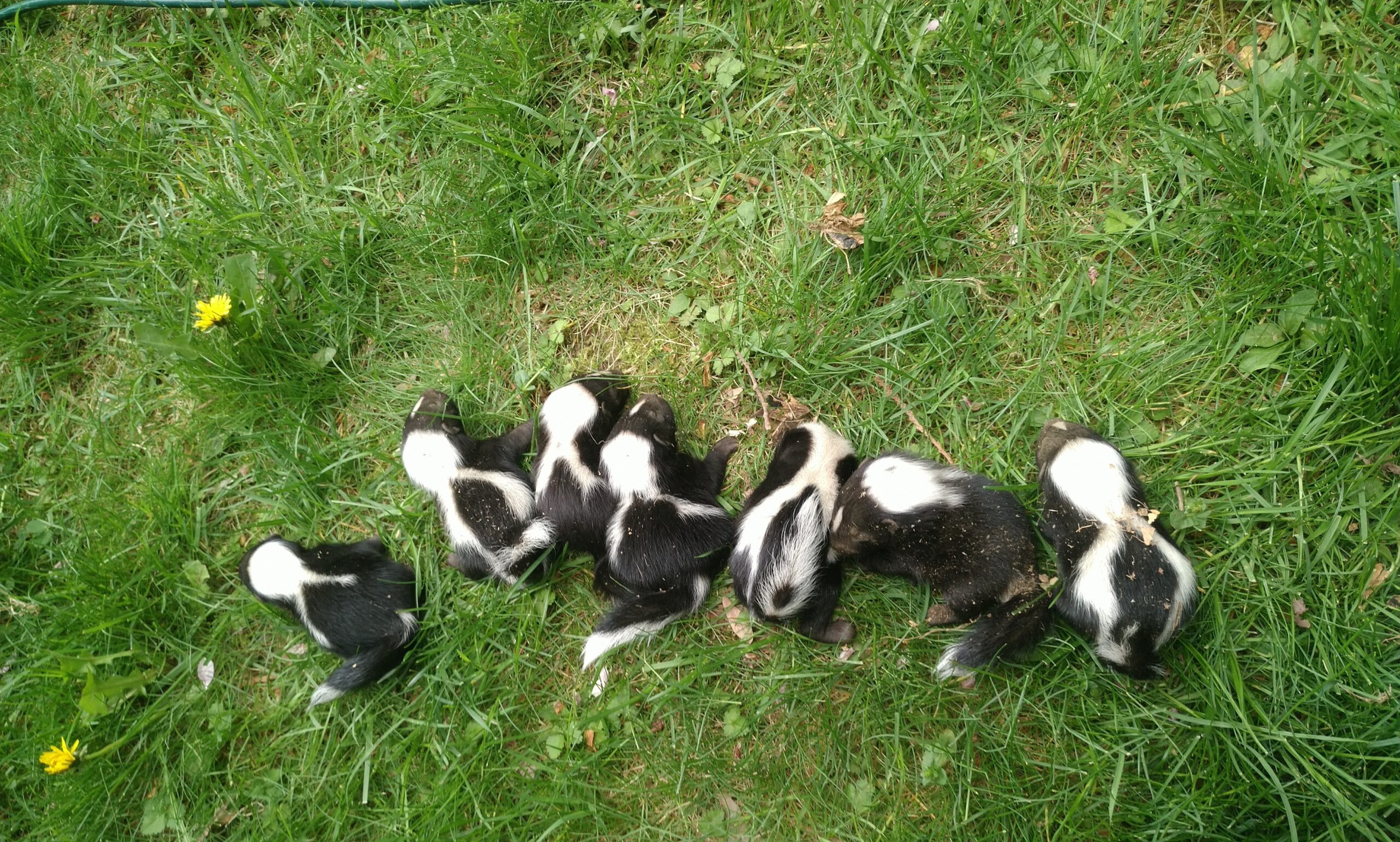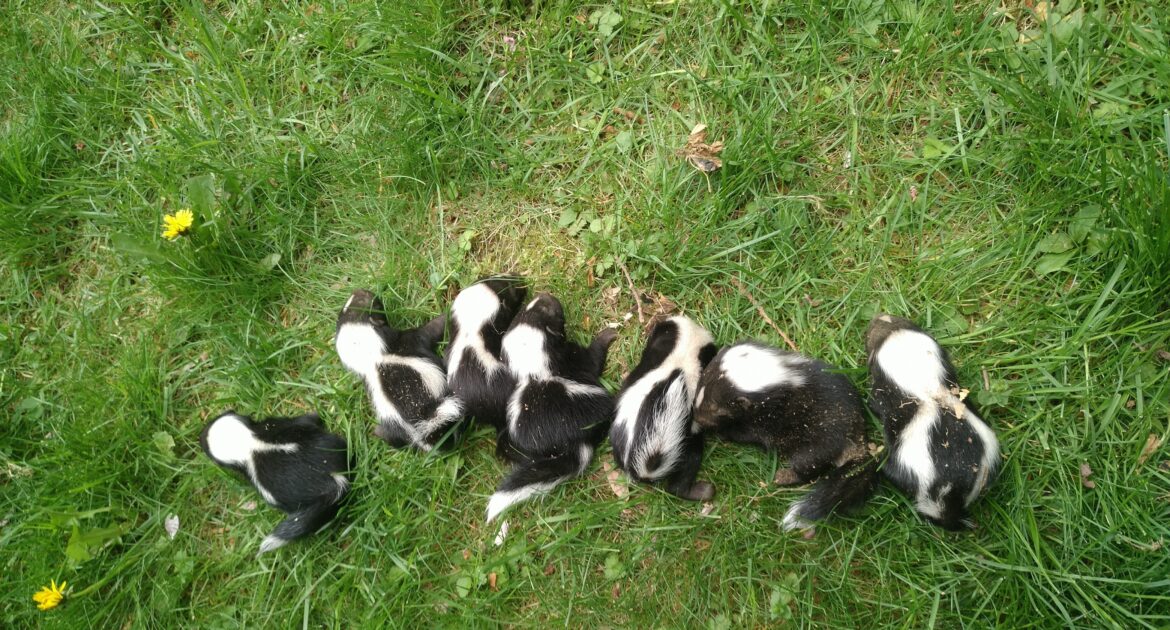Skunks are a familiar sight in Atlanta. You might spot one wandering through a yard, hiding under a deck, or even near a wooded area close to home. While their black and white fur might look charming from afar, getting too close can lead to serious problems. Many people think skunks aren’t a big deal unless they spray, but that’s not the only risk they bring. Approaching a skunk can pose dangers you may not realize, which is why skunks should be left alone.
Skunks may seem harmless, but they can lead to health problems by carrying bacteria and diseases. Plus, they can damage surfaces like decks, patios, and roofs if not cleaned properly. Tackling these issues safely is a must. That’s where Skedaddle Humane Wildlife Control in North Atlanta comes in—they’re experts at creating safer spaces for you and your family.
Why Is It Dangerous to Approach Skunks?
Encountering a skunk on your property can be an unnerving experience, and while it might be tempting to approach or try to handle the situation on your own, doing so can lead to serious risks. Skunks are wild animals with natural defense mechanisms that make close contact a bad idea—not to mention the dangers they pose beyond just their infamous spray.
From the risk of injury to the transmission of diseases, there are plenty of reasons why keeping your distance is the safest choice. Understanding the potential hazards of approaching skunks is crucial for protecting yourself, your family, and your pets.
Here’s how skunks can pose threats and why calling professionals is the smart move.
1. Risk of Being Sprayed
Skunks are famous for their ability to spray a smelly liquid when they feel threatened. And trust us, you don’t want to be on the receiving end of this defense mechanism.
The skunk’s spray isn’t just smelly—it’s incredibly strong and nearly impossible to ignore. If you or your pet get sprayed, that smell can stick around for days, no matter how many showers or baths you take. The spray can also irritate your eyes, make you feel sick, and even cause problems with breathing if inhaled. It’s not just the smell that’s the issue; it’s how it affects your health and comfort.
A spray can travel up to 10 feet, so you don’t even need to be right next to a skunk to get hit. That’s why keeping your distance and avoiding close encounters is the smartest thing you can do. If you see a skunk, slowly back away and give it space.
2. Potential for Bites and Scratches
Believe it or not, skunks can bite or scratch, just like other wild animals. If they feel scared or cornered, they might lash out defensively. And while skunks don’t usually attack unprovoked, they won’t hesitate to protect themselves or their babies.
Skunks have surprisingly sharp teeth and claws that can easily break the skin. A scratch or bite might seem like no big deal at first, but it can lead to infections. Even normally calm skunks can become aggressive if they feel their space is being invaded or their young are in danger.
That’s one more reason to avoid handling or chasing a skunk. It’s simply not worth risking injury. Instead, keep your distance and call a professional to help.
3. Risk of Disease Transmission
Skunks don’t just spray or scratch—they can also carry serious diseases that can spread to humans and pets. One of the most dangerous diseases they can transmit is rabies. Rabies is a deadly virus that affects the brain and can’t be cured if it’s not treated right away.
But rabies isn’t the only concern. Skunks can also carry leptospirosis and distemper. Leptospirosis can spread through contact with their urine or droppings, and distemper can infect pets, particularly dogs. A single bite, scratch, or even contact with contaminated areas could be enough to make you or your pet sick.
Dealing with a skunk isn’t something to take lightly. The health risks alone are enough to justify keeping your distance and letting experts step in.
4. Damage to Your Property
Skunks might not seem like big troublemakers, but they can cause significant damage to your home and yard. These animals love to dig in search of food, which often results in torn-up gardens and holes in your lawn.
Even worse, skunks can create dens under decks, porches, and sheds by burrowing. If you try to approach a skunk near its den, it might feel trapped and spray in self-defense. This could lead to lingering smells in and around your home.
And the damage isn’t limited to the outdoors. If they manage to create a den under your structure, they may weaken foundations or damage insulation and wiring. This is why keeping skunks away from your property is so important—it’s far easier to prevent damage than to fix it.
5. Skunks May Attract Other Wildlife
If there’s one wild animal you don’t want on your property, it’s a skunk. And not just because of the spray. A skunk’s presence can actually attract predators. Animals like coyotes, foxes, and large birds of prey may be drawn to your yard if skunks are living there.
The smell of a skunk’s spray or droppings can also attract other animals looking for food. Before you know it, you’re dealing with more than just a skunk problem—your property has become a magnet for unwanted wildlife.
To avoid these issues, it’s best to address skunk problems early and prevent them from sticking around. Professional wildlife control services can offer solutions to safely remove skunks without causing harm.
Atlanta Skunk Safety Tips: Avoiding Close Encounters
Want to keep skunks off your property? The good news is that there are some simple steps you can take to make your yard less inviting to them. Here are some practical tips to help you avoid close encounters with skunks:
- Secure Trash Cans: Make sure your trash cans have tight-fitting lids. Skunks are often looking for easy access to food, and open trash cans are a big temptation.
- Remove Outdoor Food Sources: Don’t leave pet food outside, and clean up any fallen fruit from trees in your yard. Skunks will take advantage of any food they can find.
- Seal Entry Points: Check for gaps or holes around your deck, shed, or crawl space, and seal them up. This will make it harder for skunks to create dens on your property.
- Add Outdoor Lights: Skunks are nocturnal, so a bright light in your yard can make them feel less safe. Motion-activated lights are an effective way to deter them.
- Keep Your Distance: If you do see a skunk, don’t panic. Slowly back away, giving it plenty of room. Quick movements or loud noises can provoke an aggressive reaction.
- Watch for Warning Signs: If a skunk starts stomping its feet, hissing, or raising its tail, it’s giving you a clear warning that it’s about to spray. Stop what you’re doing and back away immediately.
By following these tips, you can protect your property from skunks and keep your family and pets safe from harm.
Stay Safe and Skunk-Free—Call the Professionals
Skunks may appear harmless, but getting too close brings more risks than you might think. From the dangers of their spray to the potential for disease transmission, keeping your distance is the smartest and safest move. It’s a clear reason why skunks should be left alone and dealt with by professionals when necessary.
If you’re dealing with skunks on your property, Skedaddle Humane Wildlife Control in North Atlanta is here to help. We use humane methods to safely remove skunks and prevent them from coming back. Contact us today to request a quote or learn more about protecting your home and family.




